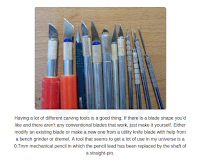When one begins working with plaster, likely as not you'll be spending a little bit of time hunting around
for some various tools, etc. to make the work easier to accomplish. Over time one will probably develop
preferred ways of doing things and collect a preferred set of tools. The following images show a selection of some of the
things I've collected over the years that I seem to use over and over. Hopefully, they will give you a
few ideas for things you may find useful as well.
When starting a new project you many need to pour a blank. So having a little petroleum jelly (and brushes) for mold release, tape measures/rulers for layout, aluminum flashing for curved forms, wooden slats for straight forms and various clamps can be very useful. Moist clay comes in handy for plugging gaps and holding form elements in place. Oh yeah, don\'t forget some duct tape and masking tape....
Have some old containers or mixing bowls sitting around that you can use for mixing plaster. The calculator is useful for estimating volumes. A measuring cup (or something similar) can be used for measuring relatively exact amounts of mixing water. For mixing large batches, a 3½ gallon bucket might be necessary.
Spend a little time poking around the hardware and/or hobby sections of local stores and you'll likely find some good candidates for your "brush collection". If you're disposed to making your own, old tooth brushes are great.
Having a lot of different carving tools is a good thing. If there is a blade shape you'd like and there aren't any conventional blades that work, just make it yourself. Either modify an existing blade or make a new one from a utility knife blade with help from a bench grinder or dremel. A tool that seems to get a lot of use in my universe is a 0.7mm mechanical pencil in which the pencil lead has been replaced by the shaft of a straight-pin.
"Repurposing" plastic food containers is a good way to get some items which can be put to use in a variety of ways. Cheap, plastic beverage cups (of varying size) can also be useful.
There are always likely to be times when you need to "rough out" a shape, so its good to have some tools capable of removing a lot of material relatively quickly. Keep in mind that if the plaster is still relatively damp, it will tend to "clog" these types of tools, so keep a wire brush handy to clean them from time to time.





